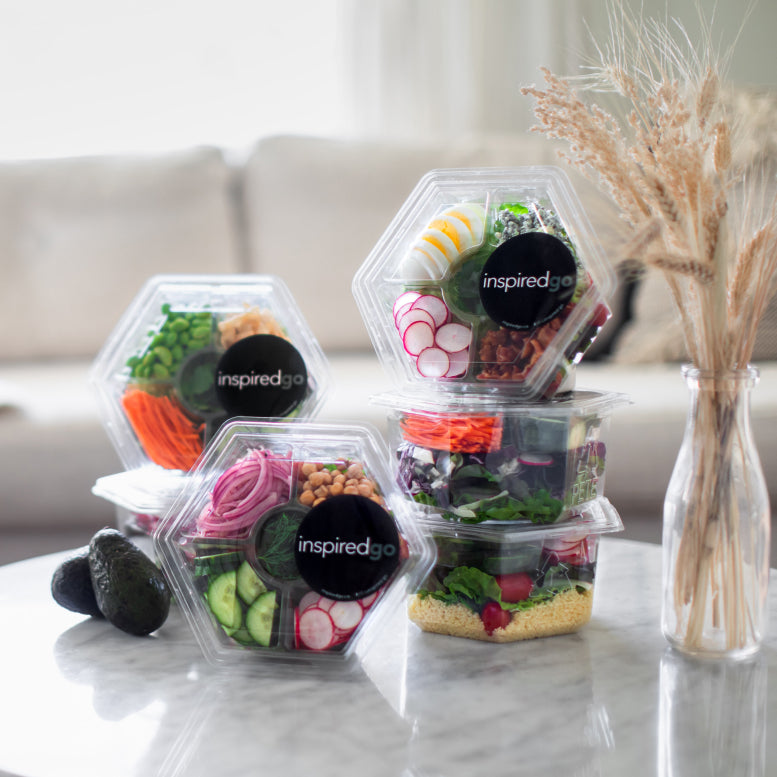What Are The Health Benefits Of Going Vegan?
Table of Contents
1. Embracing the Health Advantages of a Vegan Lifestyle
2. Is Being Vegan Healthier for You?
3. How Do Vegan Meal Delivery Services Ensure Balanced Nutrition?
4. How Does Inspired Go Make Vegan Eating Healthier?
1. Embracing the Health Advantages of a Vegan Lifestyle
The decision to transition into a vegan lifestyle goes beyond ethical reasons; it also offers a plethora of health benefits. A vegan diet is rich in essential nutrients, including fiber, antioxidants, and plant compounds, all of which contribute to improved wellbeing. Such a diet has been linked to lower risks of heart disease, high blood pressure, and type 2 diabetes. Moreover, due to the absence of animal products, this diet is naturally lower in saturated fats, which improves cholesterol levels and promotes heart health. It also aids in maintaining a healthy body weight, as plant-based foods are typically lower in calories yet highly satiating. A vegan diet encourages the consumption of a wide variety of fruits, vegetables, grains, and legumes, which are all key elements of a balanced and nutritious diet. By opting for a vegan lifestyle, individuals can enjoy increased energy levels, better digestion, and enhanced overall health.
Order fresh salads today →


2. Is Being Vegan Healthier for You?
A well-balanced vegan diet is often associated with significant health benefits, including lower cholesterol levels, reduced risk of heart disease, and improved digestion. Plant-based diets are naturally high in fiber, antioxidants, and essential vitamins while being lower in unhealthy fats and processed sugars. However, the healthiness of a vegan diet depends on balanced meal planning to include critical nutrients such as vitamin B12, iron, and omega-3 fatty acids. Vegan meal delivery services help bridge these gaps by offering carefully crafted meals that prioritize nutritional completeness. By taking the guesswork out of meal prep, these services make it easier for customers to experience the health benefits of veganism without worrying about deficiencies or imbalanced nutrition.
Choose your salads and schedule delivery →
3. How Do Vegan Meal Delivery Services Ensure Balanced Nutrition?
Balanced nutrition is a cornerstone of any vegan diet, and vegan meal delivery services excel at ensuring every meal meets essential dietary needs. Professional chefs and nutritionists collaborate to design menus that include protein-rich legumes, vitamin-packed vegetables, and healthy fats. Nutritional gaps, such as vitamin B12 or iron deficiencies, are addressed through fortified foods or supplements incorporated into meals. Meals are portioned to deliver optimal calorie counts while avoiding nutrient imbalances. Vegan meal delivery platforms also provide detailed nutritional information for transparency, allowing customers to track their intake effectively. With thoughtfully prepared meals delivered directly to customers’ doors, vegan meal delivery services simplify plant-based nutrition without compromising on taste or variety.
Get fresh salads and snacks delivered →
4. How Does Inspired Go Make Vegan Eating Healthier?
At Inspired Go, nutrition is at the core of every meal, ensuring that customers get the right balance of macronutrients and essential vitamins in every bite. Their vegan dishes include protein-packed legumes, fiber-rich vegetables, and healthy fats, eliminating the common pitfalls of nutritionally imbalanced vegan meals. Unlike some plant-based convenience foods, Inspired Go avoids highly processed ingredients, focusing instead on whole, nutrient-dense options. Each meal is carefully crafted by dietitians and chefs, ensuring that customers receive the necessary nutrients for energy, well-being, and long-term health. With detailed nutritional labeling and transparent meal planning, Inspired Go makes healthy vegan eating effortless.
Try our fresh, ready-to-eat salads →
Frequently Asked Questions
The key difference between vegan and vegetarian diets lies in the exclusion of animal products. Vegetarians avoid meat, poultry, and fish but may consume animal-derived products like eggs, dairy, or honey. Vegans, on the other hand, exclude all animal products, focusing solely on plant-based foods. Veganism is often a lifestyle choice, avoiding animal products in all forms, including clothing and cosmetics.
A vegan diet consists entirely of plant-based foods, including fruits, vegetables, grains, nuts, seeds, and legumes. It excludes all animal-derived products, such as meat, fish, dairy, and eggs. This diet emphasizes nutrient-dense, whole foods, though processed vegan alternatives are available. A vegan diet, when well-balanced, supports good health and environmental sustainability, making it popular for ethical, health, and ecological reasons.
Not all vegan diets are gluten-free. While veganism excludes animal products, gluten is a protein found in wheat, barley, and rye, which are plant-based and commonly included in vegan meals. To maintain a vegan and gluten-free diet, focus on naturally gluten-free foods like fruits, vegetables, rice, quinoa, and gluten-free grains. Always check labels for hidden gluten in processed vegan foods.
On a vegan diet, you can enjoy a wide variety of plant-based foods, including fruits, vegetables, legumes, nuts, seeds, whole grains, and plant-based dairy alternatives. Popular vegan dishes include stir-fries, salads, grain bowls, soups, and curries. Incorporating fortified foods or supplements ensures you meet nutrient needs like B12, iron, and omega-3s, making the diet balanced and enjoyable.
A vegan diet can be very healthy when balanced and diverse. It’s rich in fiber, vitamins, and antioxidants, while being lower in saturated fat and cholesterol. These factors contribute to better heart health, weight management, and reduced risk of chronic diseases. However, careful planning is essential to ensure adequate intake of nutrients like vitamin B12, iron, and protein for overall health.

